
The cello ( CHEL-oh), or violoncello ( VY-ə-lən-CHEL-oh, Italian pronunciation:[vjolonˈtʃɛllo]), is a bowed (sometimes plucked and occasionally hit) string instrument of the violin family. Its four strings are usually tuned in perfect fifths: from low to high, C2, G2, D3 and A3. The viola's four strings are each an octave higher. Music for the cello is generally written in the bass clef, with tenor clef, and treble clef used for higher-range passages.

The double bass, also known as the upright bass, the acoustic bass, or simply the bass, is the largest and lowest-pitched chordophone, in the modern symphony orchestra. Similar in structure to the cello, it has four or five strings.

Jazz guitar may refer to either a type of electric guitar or a guitar playing style in jazz, using electric amplification to increase the volume of acoustic guitars.
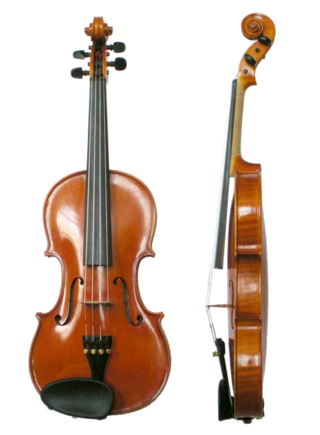
The violin, colloquially known as a fiddle, is a wooden chordophone, and is the smallest, and thus highest-pitched instrument (soprano) in regular use in the violin family. Smaller violin-type instruments exist, including the violino piccolo and the pochette, but these are virtually unused. Most violins have a hollow wooden body, and commonly have four strings, usually tuned in perfect fifths with notes G3, D4, A4, E5, and are most commonly played by drawing a bow across the strings. The violin can also be played by plucking the strings with the fingers (pizzicato) and, in specialized cases, by striking the strings with the wooden side of the bow.

Orchestration is the study or practice of writing music for an orchestra or of adapting music composed for another medium for an orchestra. Also called "instrumentation", orchestration is the assignment of different instruments to play the different parts of a musical work. For example, a work for solo piano could be adapted and orchestrated so that an orchestra could perform the piece, or a concert band piece could be orchestrated for a symphony orchestra.

Bebop or bop is a style of jazz developed in the early to mid-1940s in the United States. The style features compositions characterized by a fast tempo, complex chord progressions with rapid chord changes and numerous changes of key, instrumental virtuosity, and improvisation based on a combination of harmonic structure, the use of scales and occasional references to the melody.

In musical instrument classification, string instruments or chordophones, are musical instruments that produce sound from vibrating strings when a performer plays or sounds the strings in some manner.

Pizzicato is a playing technique that involves plucking the strings of a string instrument. The exact technique varies somewhat depending on the type of instrument:
In music, an ostinato is a motif or phrase that persistently repeats in the same musical voice, frequently in the same pitch. Well-known ostinato-based pieces include classical compositions such as Ravel's Boléro and the Carol of the Bells, and popular songs such as Donna Summer and Giorgio Moroder's "I Feel Love" (1977), Henry Mancini's theme from Peter Gunn (1959), The Who's "Baba O'Riley" (1971), and The Verve's "Bitter Sweet Symphony" (1997).
A variety of musical terms are encountered in printed scores, music reviews, and program notes. Most of the terms are Italian, in accordance with the Italian origins of many European musical conventions. Sometimes, the special musical meanings of these phrases differ from the original or current Italian meanings. Most of the other terms are taken from French and German, indicated by Fr. and Ger., respectively.
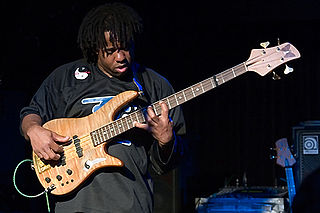
Bassline is the term used in many styles of music, such as blues, jazz, funk, dub and electronic, traditional, and classical music, for the low-pitched instrumental part or line played by a rhythm section instrument such as the electric bass, double bass, cello, tuba or keyboard.
In music, variation is a formal technique where material is repeated in an altered form. The changes may involve melody, rhythm, harmony, counterpoint, timbre, orchestration or any combination of these.

Playing the violin entails holding the instrument between the jaw and the collar bone. The strings are sounded either by drawing the bow across them (arco), or by plucking them (pizzicato). The left hand regulates the sounding length of the strings by stopping them against the fingerboard with the fingers, producing different pitches.
The Sonata for Solo Violin Sz. 117, BB 124, is a sonata for unaccompanied violin composed by Béla Bartók. It was premiered by Yehudi Menuhin, to whom it was dedicated, in New York on 26 November 1944.
The term Romani style refers to the way Eastern European music is played in coffeehouses and restaurants, at parties, and sometimes on-stage in European cities. Music played in this style differs from actual Romani music played by Romani and Sinti people, many of whom regard the term "gypsy" as a slur when applied to their community.
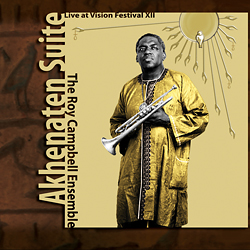
Akhenaten Suite is the seventh album by American jazz trumpeter Roy Campbell, an extended work inspired by Amenhotep IV, Pharaoh of the 18th dynasty of Egypt. The project was specially commissioned by Arts for Art, recorded live at the 2007 Vision Festival and released on AUM Fidelity.
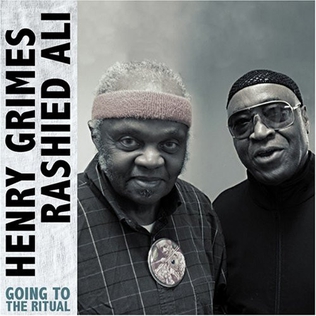
Going to the Ritual is a live album by bassist Henry Grimes and drummer Rashied Ali. It was recorded in 2007 in concert at WKCR studios, Columbia University, New York City, and was released by Porter Records in 2008.
Oluyemi Thomas is a free jazz bass clarinetist and saxophonist.
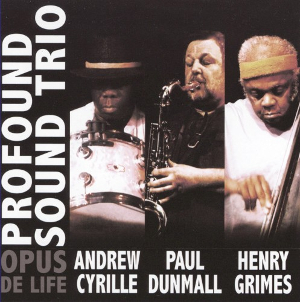
Opus de Life is a live album by the Profound Sound Trio: drummer Andrew Cyrille, saxophonist Paul Dunmall, and bassist/violinist Henry Grimes. It was recorded in June 2008 at the Vision Festival held at the Clemente Soto Velez Cultural and Educational Center in New York City, and was released by Porter Records in 2009.

Spirits Aloft is a live album by bassist Henry Grimes and drummer Rashied Ali. It was recorded in February 2009 at Rutgers University in Camden, New Jersey, and was released by Porter Records in 2010.














